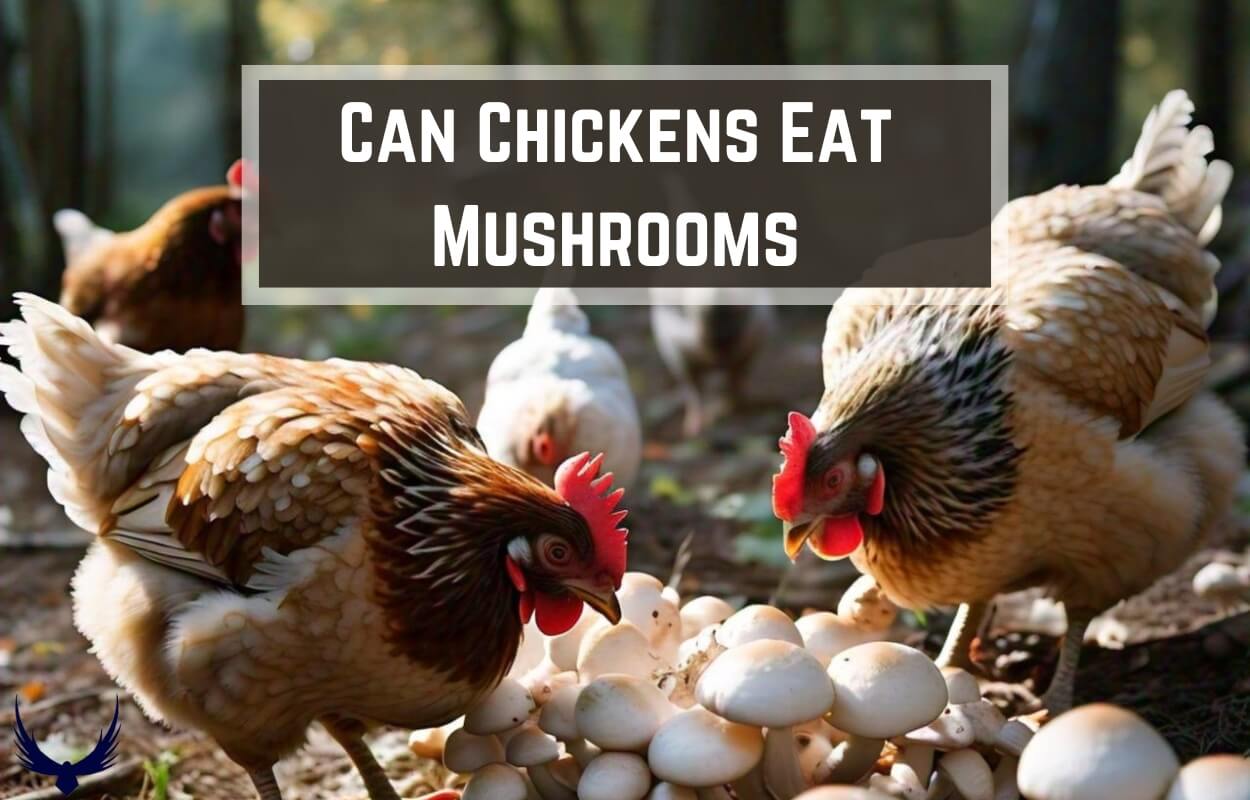In backyard farming, chickens are seen as good at eating scraps. But when it comes to mushrooms, things are not so simple. People who raise chickens and experts have debated whether it’s safe for chickens to eat mushrooms. Chickens eat a variety of foods, but mushrooms are different and need to be thought about carefully.
In this article we will explore the benefits and risks of giving mushrooms to chickens. Let’s find out can chickens eat mushrooms.
What are Mushrooms and Can Chickens Eat Mushrooms?
Mushrooms are a type of fungal growth that typically consists of a stem and cap. They come in a wide variety of shapes, sizes, and colors. Some mushroom species are edible and commonly used in cooking, while others are poisonous and should be avoided. So, Can Chickens Have Mushrooms?
Yes, chickens can eat certain types of mushrooms. Mushrooms are a nutritious source of protein, vitamins, and minerals. It is important to be cautious and only feed your chickens mushrooms that are known to be safe and non-toxic. Wild mushrooms can be toxic and even deadly for chickens.
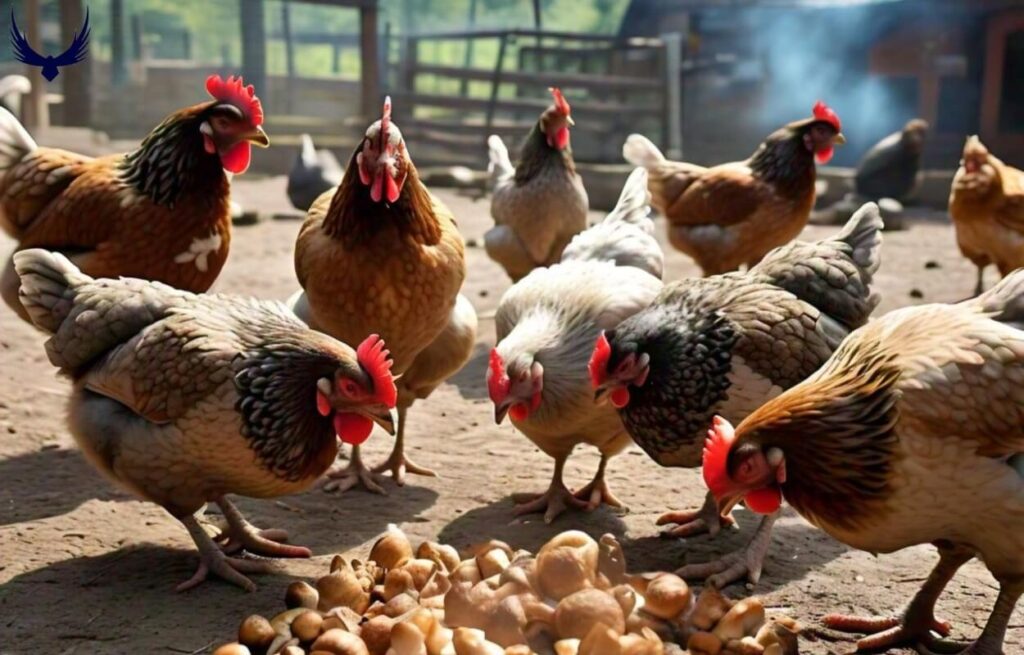
Safe mushrooms for chickens include button, oyster, shiitake, and puffball mushrooms. These can be given as a treat or mixed into their food for extra protein and nutrients. It’s important to maintain a balanced diet for the chickens and not rely solely on mushrooms.
Nutritional Benefits of Mushrooms for Chickens
Following are the nutritional benefits of mushrooms for chickens:
Proteins
Mushrooms are a good source of plant-based protein that chickens need for growth, development, and maintenance. Different types of mushrooms have different protein levels, but on average they can provide around 20% to 35% of their dry weight as protein.
The protein in mushrooms is of high quality and contains all the essential amino acids that chickens need.
Vitamins
Vitamin D: Mushrooms exposed to UV light are an excellent source of vitamin D, which is crucial for calcium absorption and bone health in chickens
B Vitamins: Mushrooms are rich in Vitamin B Complex, including Niacin (B3), Riboflavin (B2), and Pantothenic Acid (B5), which play essential roles in energy metabolism and overall health.
Minerals
Selenium: Mushrooms are one of the best dietary sources of selenium, an essential mineral that supports immune function and antioxidant defense mechanisms in chickens.
Copper: Mushrooms contain copper, a mineral essential for proper feather pigmentation, energy production, and immune function in chickens.
Potassium: Mushrooms are a good source of potassium. It helps to maintain proper fluid balance and muscle function.
Phosphorus: Mushrooms provide phosphorus which is necessary for strong bones, egg production, and energy metabolism in chickens.
Antioxidants
Mushrooms are rich in various antioxidants including ergothioneine, tocopherols, phenolics, and ascorbic acid which can help protect chickens from oxidative stress and support their overall health.
β-Glucans
Mushrooms contain β-glucans which are beneficial polysaccharides that can enhance the immune system and improve overall health in chickens.
Conjugated Linoleic Acid (CLA)
Some mushroom varieties, such as oyster mushrooms contain CLA, a fatty acid with potential anti-inflammatory and weight management benefits for chickens.
Fiber
Mushrooms are a good source of dietary fiber which can help in digestion and promote a healthy gut in chickens.
Other Nutrients
Mushrooms also provide small amounts of iron, zinc, and various other vitamins and minerals beneficial for chickens.
How to Feed and Serve Mushrooms to Chickens
Feeding and serving mushrooms to chickens requires some preparation and care to ensure their safety and well-being. Following are the methods to feed and serve mushrooms to chickens:
Choosing Safe Mushrooms
Choose common edible mushroom varieties such as button, portobello, oyster, or shiitake mushrooms. Avoid wild mushrooms or those you cannot identify with certainty, as some varieties can be toxic to chickens.
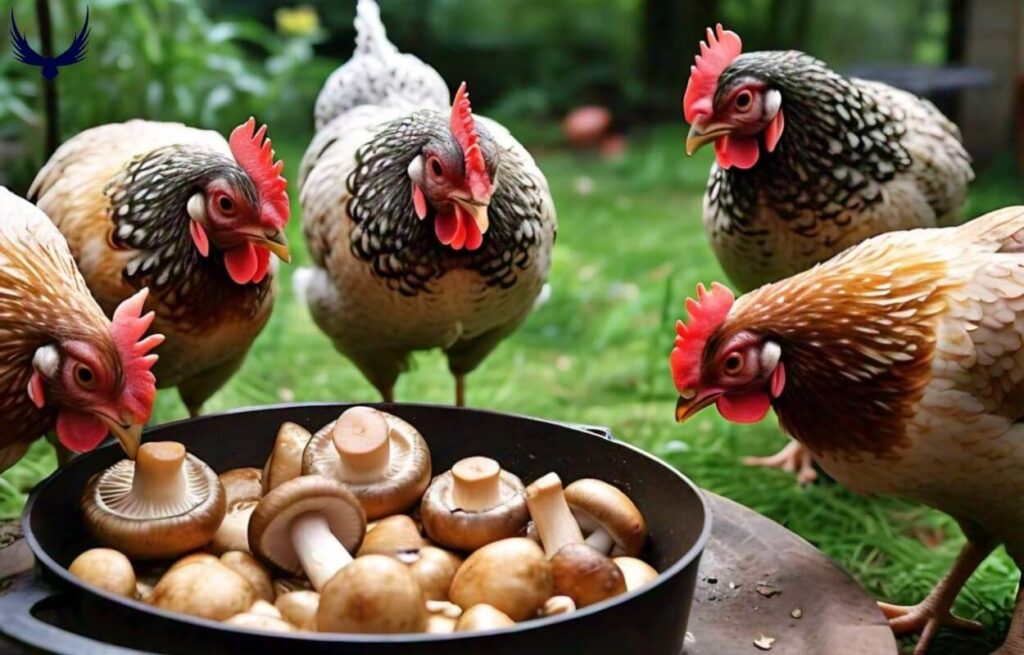
Preparing the Mushrooms
Clean the mushrooms by wiping them with a damp cloth or brush to remove dirt. Remove tough stems or damaged parts. Cook the mushrooms to get rid of harmful bacteria and make them easier to digest before serving.
Cooking Methods
Cook the mushrooms in a small amount of vegetable oil or bake them in the oven without any extra seasonings or butter. You can also boil them but make sure to drain and cool them before giving them to the chickens. Avoid using excessive oil, butter, or seasonings, as these can be harmful to chickens.
Serving Methods
- Chop or slice the cooked mushrooms into small pieces and mix them with their regular feed.
- Serve the cooked mushrooms separately in a dish. Ensure that the mushrooms are easy to reach and not hidden under other food.
How Often Can Chickens Eat Mushrooms
Here is the guide on how often chickens can eat mushrooms:
Frequency
Mushrooms should be treated as an occasional treat not a regular part of their daily diet. It is recommended to feed mushrooms to your chickens no more than once every 2 to 4 weeks. Feeding them more frequently than this can lead to nutritional imbalances.
Amount
The amount of mushrooms for chickens should be limited, based on their age and size. For adult chickens, feed about 1 to 2 tablespoons of cooked mushrooms per bird.
For younger chickens or chicks, the amount should be reduced to around 1 teaspoon of cooked mushrooms per bird. Overfeeding mushrooms can cause digestive problems, so moderation is key.
Rotation with Other Treats
To keep your chickens healthy, it’s recommended to rotate mushrooms with other healthy treats, such as fruits like (kiwi, strawberries, oranges, & grapes) vegetables like celery & jalapenos or cooked grains. This prevents your chickens from becoming bored with the same treat and ensures they receive a variety of nutrients.
Risks of Feeding Mushrooms to Chickens
Feeding mushrooms to chickens can be a healthy addition to their diet, but there are some risks to be aware of. Here is a guide on the risks of feeding mushrooms to chickens:
Toxicity
The biggest risk of feeding mushrooms to chickens is toxicity. Many wild mushrooms can be toxic or even fatal to chickens if ingested. It’s important to feed chickens only commercially grown, edible mushrooms that are safe for consumption such as button, portobello, oyster, or shiitake mushrooms.
Digestibility
Mushrooms have nutrients for chickens, but they can be hard to digest, especially when given raw or in large amounts.
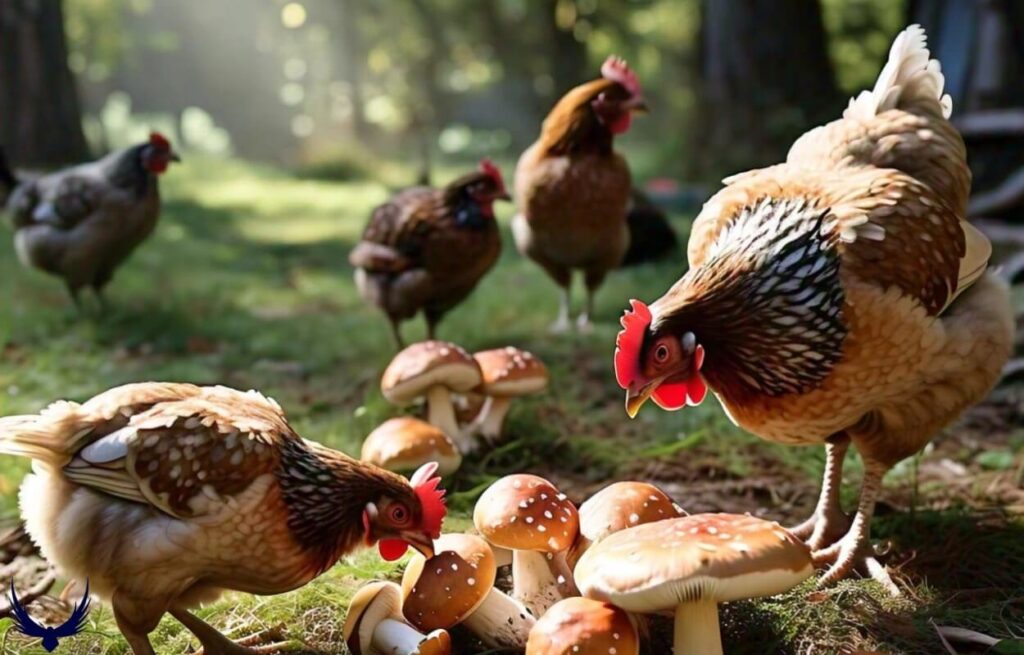
Feeding too many raw mushrooms can lead to digestive issues such as diarrhea or crop blockage. It’s better to cook the mushrooms before giving them to your chickens for easier digestion.
Allergic Reactions
Some chickens can be allergic to certain mushrooms. When giving your chickens mushrooms, start with small amounts to watch for any allergic reactions like respiratory distress, swelling, or skin irritation.
Contamination
Mushrooms can be susceptible to contamination by bacteria, fungi, or pesticides if they are not properly cleaned or stored. Always thoroughly clean and cook mushrooms before feeding them to your chickens to keep them safe. Avoid feeding spoiled or moldy mushrooms because they can have harmful toxins.
Can Chickens Eat Raw Mushrooms?
Yes, chickens can eat raw mushrooms in moderation. Chickens are omnivores and can consume a variety of plant and animal foods, including mushrooms. Mushrooms are a good source of nutrients like selenium, potassium, and vitamin D for chickens.
Certain types of wild mushrooms can be toxic to chickens, so it’s best to stick to store-bought, edible mushroom varieties. Ensure the mushrooms are fresh, washed, and free from any pesticide residue before feeding them to your flock.
Can Chickens Eat Cooked Mushrooms?
Yes, chickens can eat cooked mushrooms. Cooked mushrooms are safe for chickens to consume and can be a healthy addition to their diet. Cooking mushrooms can help break down some of the tough fibers, making them easier for chickens to digest.
Avoid adding excessive oils, butter, or seasonings when cooking mushrooms for your flock.
Can Chicks Eat Mushrooms?
Chicks should not be fed mushrooms until they are at least 6 to 8 weeks old. Their delicate digestive systems are still developing in the early weeks and mushrooms can be difficult for them to digest properly.
Once chicks reach age of 2 months, you can start introducing small amounts of finely chopped or mashed mushrooms into their diet about a teaspoon per chick
As the chicks grow older and their digestive systems mature, you can gradually increase the amount, but mushrooms should still be fed in moderation as a treat rather than a primary part of their diet.
Can Chickens Eat White Mushrooms?
Yes, chickens can eat white mushrooms. These mushrooms are common in grocery stores and grow in clusters on compost or manure-rich soil. They have a smooth, white cap and a short, white stem. White mushrooms are mild and earthy in flavor. They can give chickens nutrients like protein, vitamins, and minerals when fed in moderation
Can Chickens Eat Portobello Mushrooms?
Yes, chickens can eat portobello mushrooms. Portobello mushrooms are a large type of mushroom that is similar to white mushrooms. They have a thick stem and a wide cap with an earthy taste. Chickens can benefit from their protein, vitamins, and minerals.
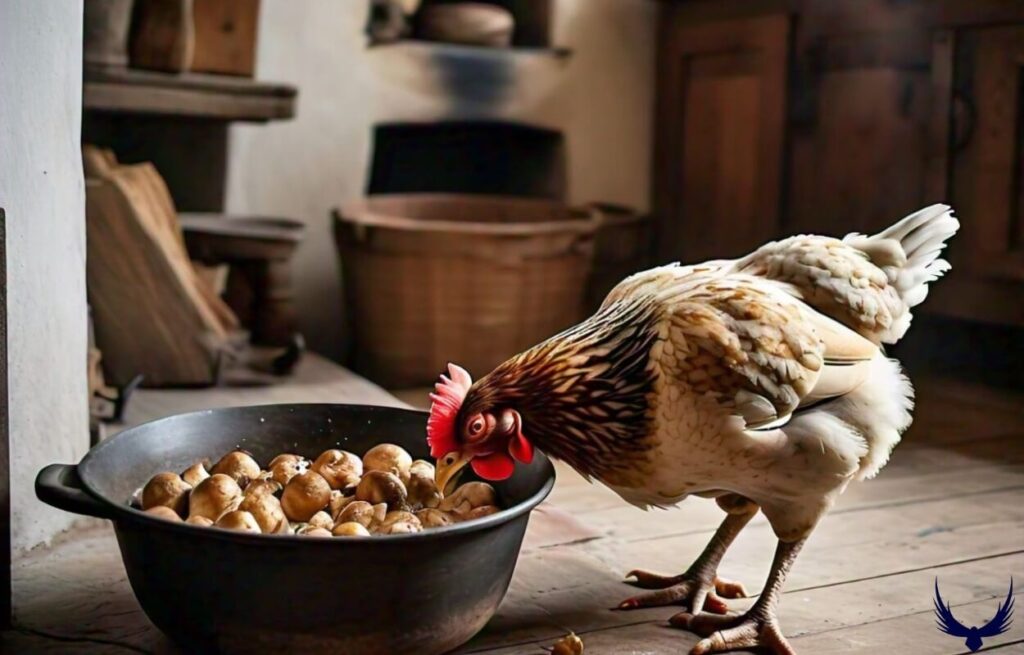
It also has compounds that may help fight inflammation, prevent damage from free radicals, and reduce the risk of cancer.
Can Chickens Eat Oyster Mushrooms?
Yes, chickens can eat oyster mushrooms. Oyster mushrooms are edible mushrooms that grow in clusters on dead trees or decaying logs. They have a fan or oyster-shaped cap in white, gray, or brown colors. Oyster mushrooms have a delicate taste and velvety texture. It is rich in antioxidants and helps to lower bad cholesterol levels.
Can Chickens Eat Puffball Mushrooms?
Yes, chickens can eat puffball mushrooms. It grows on the ground in meadows, fields, and forests. They start as round, white balls that look like softballs or small baseballs. Only feed chickens completely white puffballs mushroom, as older ones can be harmful.
Giant puffballs have bioactive compounds like β-sitosterol and melanin that can stop the growth of inflammatory immune cells by targeting specific molecules.
Can Chickens Eat Shiitake Mushrooms?
Yes, chickens can eat shiitake mushrooms. Shiitake mushrooms grow on decaying hardwood trees in clusters. They have a brown or tan umbrella-shaped cap with white gills underneath. It has polysaccharides like lentinans and β-glucans.
These compounds protect cells and boost the immune system to fight off germs. Polysaccharides also reduce inflammation. Remove the tough stems before feeding them to chickens.
Can Chickens Eat Button Mushrooms?
Yes, chickens can eat button mushrooms. Button mushrooms are the immature form of white mushrooms and are essentially the same species. Button mushrooms have small white caps and short stems, with a mild taste. They are safe for chickens and can offer protein, vitamins, and minerals.
Can Chickens Eat Morel Mushrooms?
Yes, chickens can eat morel mushrooms in moderation. Morels (Morchella spp.) are unique mushrooms that grow in the wild, usually in forests or near trees in the spring. They have a cap that looks like a honeycomb, ranging in color from tan to brown, and a hollow stem.
Morels have a rich, earthy, nutty taste. It has bioactive compounds such as tocopherols and ergosterols that have anti-inflammatory, anti-oxidative, and anti-cancer abilities.
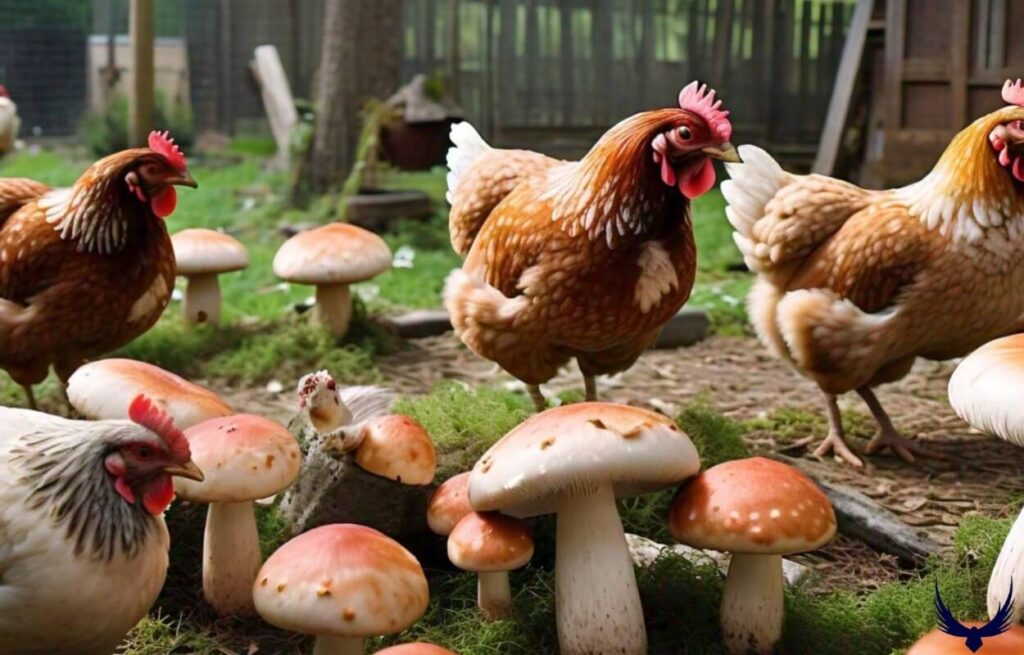
It’s safe for chickens to eat them, but make sure they are correctly identified by an expert because there are poisonous mushrooms that look similar.
Can Chickens Eat Baby Bella Mushrooms?
Yes, chickens can eat Baby Bella mushrooms. Baby Bella mushrooms are brown versions of cremini or button mushrooms. They grow in clusters on compost or manure-enriched soil. Baby Bellas have a firm, light brown cap with a short, pale stem.
Baby bellas are safe for chickens to consume in moderation and can provide protein, vitamins, and minerals as a nutritious treat. These minerals in Baby Bella mushrooms help to strengthen bones, and lower the risk of diseases like heart disease, diabetes, and arthritis.
Can Chickens Eat Mushrooms Growing in My Yard?
Chickens should not eat mushrooms from the yard unless you are sure that these mushrooms are safe. Many wild mushrooms can be poisonous to chickens. It’s not recommended to feed chickens any yard mushrooms. Some mushrooms that are safe for humans can be toxic to chickens.
If you are not an expert, it’s best to avoid feeding yard mushrooms to your chickens. Stick to store-bought or reputable mushrooms to be safe. It’s better to avoid random mushrooms to prevent illness or toxicity.
Types of Mushrooms Chickens Can Eat
Here are the 10 types of mushrooms that chickens can eat:
- White Button Mushrooms
- Cremini/Baby Bella Mushrooms
- Portobello Mushrooms
- Oyster Mushrooms
- Shiitake Mushrooms
- Puffball Mushrooms (when young and white inside)
- Morel Mushrooms (when positively identified)
- Enoki Mushrooms
- Maitake Mushrooms
- Cremini Mushrooms
- Chicken of the Woods Mushrooms (when positively identified)
FAQs – Can Chickens Eat Mushrooms?
Can Chickens Eat Mushrooms from the Grocery Store?
Yes, chickens can eat many types of mushrooms that are found in grocery stores. White button mushrooms, cremini/baby bella mushrooms, portobello mushrooms, and oyster mushrooms. These varieties are cultivated for human consumption and are perfectly safe for chickens when fed in moderation as a treat.
Can Chickens Eat Mushroom Scraps?
Yes, chickens can eat mushroom scraps. Mushroom scraps, such as stems, caps, and trimmings, are perfectly safe for chickens to consume. These scraps have nutrients that are good for chickens. Just make sure the scraps are fresh and not moldy. Don’t give your chickens scraps from poisonous mushrooms.
Can Chickens Eat Mushroom Stems?
Yes, chickens can eat mushroom stems. Mushroom stems are safe and edible for chickens to consume, just like caps. The stems contain many of the same nutrients as the rest of the mushroom. You can give chickens whole, chopped, or cooked mushroom stems.
Do Chickens Like Mushrooms?
Most chickens seem to enjoy eating mushrooms and peck at them when offered. The taste and texture of mushrooms appear to be appealing to their palate. It’s best to introduce mushrooms gradually to your flock. Some chickens may be more hesitant or picky eaters and may need more time to acquire the taste.
The type of mushroom can also influence a chicken’s preference. Generally, milder varieties like button or portobello mushrooms tend to be more readily accepted than more strongly flavored mushrooms.

